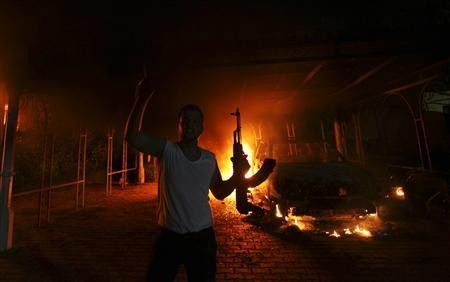WIll The Libyan Attacks Make The U.S. Leery Of Intervening In Syria?
ANALYSIS

The death of Ambassador Christopher Stevens has swung the spotlight back to Libya, a country which the U.S. more or less forgot about after the death Colonel Moammar Gadhafi last October.
The question now, of course, is what will the U.S. do?
In his statement at the White House on Wednesday, President Barack Obama said that "justice will be done," but Tommy Vietor, a White House spokesman, said they were hesitant to "ascribe any motive to this reprehensible act."
The New York Times reported that the Ambassador was in car, being transported to a safe location, when gunmen "fired rockets" at his vehicle. Other sources told CNN that the group who carried out the attack was "pro Al-Qaeda," but doubted that the Ambassador himself had been targeted. CNN also said that the attacks were planned, and the protests were used as a distraction.
U.S. Secretary of State Hillary Clinton said, "we are working to determine the precise motivations and methods of those who carried out this assault," making reference to the protests outside the U.S. Embassy in Cairo and the inflammatory, anti-Mohammed video that supposedly sparked it all.
She also assured reporters, and any Libyan diplomats watching, that "the attack by a small and savage group" would not harm Libya-U.S. relations.
"The friendship between our countries...will not be another casualty of this attack," Clinton said. "A free and stable Libya is still in American's interest."
The U.N. "strongly condemned" the death of Stevens. The head of the Libyan Congress and the Libyan Ambassador to the U.S. also quickly came forward, condemned the attacks, and apologized. Even at the other site of the protests, Cairo, the Muslim Brotherhood called for "peaceful protests," the AFP said.
Everyone seems ready to kiss and make up.
But then there's Syria. The violence in that country has spilled over into neighboring Lebanon, and now, many fear, Egypt and Libya may next enter a period of similar unrest and turmoil.
If nothing else, it could greatly complicate the U.S.' policy of non-intervention in Syria thus far, writes Ben Gilbert for Al-Monitor.
"This tragic incident will have ramifications both locally and regionally, and probably all but end any possibility of intervention in Syria," Gilbert wrote.
"Images coming out of Libya look more like 'Black Hawk Down' than the Arab Spring. Except this time, it's the guys we armed who did it. The beards and the black flags they're flying sure look similar to the beards and black flags the Syrian rebels are flying."
And given that a man who was trying to help the Libyans was just killed, the attacks may make the U.S. more skittish about intervening in Syria, under the assumption that there's little that can be done, as Ian Black of the Guardian pointed out.
"Coming amid the U.S. presidential campaign," Black wrote, "the attacks are likely to curb what enthusiasm remains for U.S. activism in the Arab world as the fear of Islamist chaos overwhelms hope for the springtime of Arab democracy. Syrians hoping that the U.S. will back [a] Libyan-style intervention or arm the rebels will be disappointed. ... Arab governments want to get on well with Washington but their relationships will always be vulnerable to provocations by extremists on both sides.
© Copyright IBTimes 2024. All rights reserved.






















